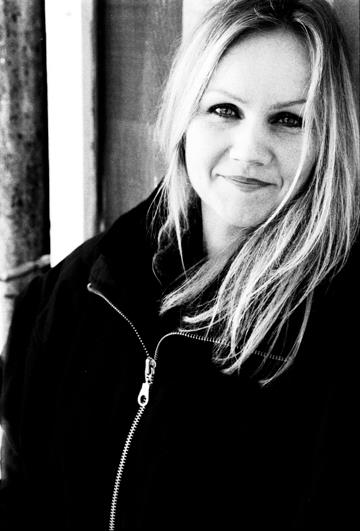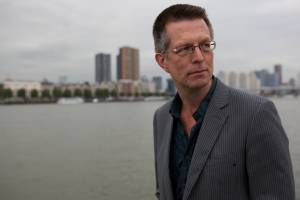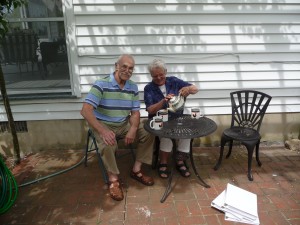Johan Bakker about Eva Cassidy: “When I hear her voice, she still touches me.”
The American singer Eva Cassidy (1963-1996) died almost twenty years ago. Yet she seems more popular than ever before. This year Coosje Smid scored a hit with her performance of “Fields of Gold” and singer Margriet Sjoerdsma prepares an extensive tribute theatre tour together with Eva’s brother. Johan Bakker wrote a book about the late musician. In the UK it won a prize.
By Maurice Dielemans
“One day the CD Songbird lay on the doormat. It took a while before it ended up in the player, because the cover looked a bit amateurish. Once I listened to the album, I knew immediately that this was something special. “
Johan Bakker lives and works in Rotterdam. He is a freelance journalist and he writes about music, art and literature. Most of his pieces appear in Dutch newspaper Nederlands Dagblad. Baker grew up in the punk era. “My parents listened to classical music. I also had piano lessons. At the end of primary school, in the seventies, my fascination for pop music began. I grew up in Groningen and there was a thriving music scene with local bands like The Streetbeats, White Honey and Herman Brood. Pubs could stay open longer if they had live music, so that was a fertile area for pop music. I also listened to Neil Young and Bob Dylan. As I get older, I listen more and more to minimalist music. Recently I heard a very nice CD of improvisations on the music of Bach by Hannes Minnaar. Currently I listen to a new CD with old recordings of Keith Jarrett.”
Baker’s biography – Behind the Rainbow, the Tragic Life of Eva, – is his first book. A second book is in the making. That is a different story, he explains, it is about a one-way trip to Mars. It goes without saying that he would take enough CDs Eva Cassidy should that trip ever come. “At one point I started to specialize in jazz. As a jazz journalist, you come across all sorts of vocal music and so I discovered Eva Cassidy. There are undoubtedly better folk or jazz singers, like for instance Ella Fitzgerald. But the magic of Eva was that she mastered so many different styles and genres. Every time I hear her voice, she touches me again. “
What was the main reason for you to write a book about Eva Cassidy?
“I had many questions and was very curious. She sang a lot of gospel, for instance, while she was raised by non-Christian parents. Nobody had an immediate answer, but there seemed to be a long history behind it about a pastor had converted her. Eva was also very stubborn. Nowadays you have a lot of those singers who do everything to get a record deal and become popular. Eva Cassidy was exactly the opposite. When the President of Blue Note called to tell her that he was interested, she travelled to New York to sing a song for him. But at the end of the day the stubborn singer left the room saying that she did not want to stick to just jazz. She left the band obviously flabbergasted; it had been their ultimate dream to become professional musicians.”
Eva died young from the effects of skin cancer. Only after her death, when British dj Terry Wogan played her music on UK Radio 2, she reached international fame. Why didn’t she manage during her life to break through, do you think?
“While writing, you get to know a person behind the music. Eva had a lot of trouble meeting new people. Musically, she never had the confidence that she actually deserved. At primary school she was bullied because she was vulnerable. In love, she was unhappy and she was incredibly shy. She made many recordings with her boyfriend, Chris Biondo. Initially Eva could not even sing in the studio, let alone on stage. She locked herself up in a closet with a guitar and a microphone. She had a huge fear of failure. She probably inherited it from her father, who often told her that you should never be satisfied with her own performance. Despite her introverted nature, she nevertheless chose to enter the stage.”
“Making music, preferably on her own in the studio, was everything to her. Every time the guys in the band tried to persuade her to play. She was very withdrawn and could only express herself through her music and her paintings. I think that she was a better musician than a painter though. “
Most of the time she sang songs from others. Why didn’t she write her own material?
“Eva had a natural talent to improve existing songs like Over the Rainbow. She delivered the first note an octave higher, which was brilliant. Of course I’m very curious to see how her work would have sounded. In the jazz world, it is very common to play covers, it’s about what you do with them. You improvise on an existing theme. in pop music this is different, people expect you to make your own songs.”
You tried to find Eva’s roots in your biography. How exactly did you do that?
“It was a hard road and I had to operate very carefully. I started with an email to a website where the family sells reproductions of Eva’s paintings. I introduced myself as a Dutch journalist and said I wanted to write a book about Eva. Eva’s father responded. At the beginning he was very open and answered all my questions kindly, but once he realized I was working on a real book, he became hesitant and suddenly I didn’t receive response anymore. From that moment, I had to deal with the family lawyer, who told me that the family wanted not only to share in the profits and that I could only write what they allowed me to write. This was no option for me, because the book initially was intended for the Dutch market only. I had talks with small publishers. If you do research for two years, have to travel to America a few times and you sell a only few hundred books, this will not make you very rich. For me this was pure idealism.”
And why did you decide to go on with this ambitious project?
“As a music journalist, you want to leave a legacy more than just another CD review. When the Casisdy’s began about fifty percent of the profits, we were talking on totally different wavelengths. Luckily I was at the right time to contact Eva’s brother. Dan Cassidy had distanced himself a bit from the rest of the family, and he lives in Iceland. He wanted to talk to me in person to see what was exactly the point. Talking with him is pleasant, because he is a contemporary of mine. He likes to read music biographies, he understands that you should not glorify your subject and he felt that his sister deserved a good book. In a short time we have become friends. In May 2011, he invited me to meet his parents. This plan almost failed, because a volcano erupted in Iceland. Eventually the Cassidy’s and I talked one afternoon about all kinds of things. “
You had to convince them of your intentions?
“At one time, the parents withdrew from the project. They literally said that time is too precious at their age. They tried to sign up under certain conditions. The lawyer from the Cassidy family had a red pen at the ready. She said. “We have three hundred hours of interview material on tape. On that basis, you can write a book..” Of course, I could not agree. As a journalist I believe in the freedom of expression and no one can keep me from writing.”
Did you receive a response from the Cassidy family on your book?
“Eva’s parents would rather have had a nice story. I know that they are not happy with the English title of the book. They say that Eva’s life wasn’t tragic. Another unfortunate choice of the publisher was the picture on the front, which was also on a previously published, uncritical book about Eva Cassidy.”
You’ve never met Eva. What would you have asked her if you had the chance?
“I’d like to know how she would look at the quarrels between her parents and her former band members . I’m fairly certain that this would fill her with disgust. At the same time she was very close with her mother, who was her best friend. Another question would be how she would have developed musically. Her parents think that she would have become a soloist, but this has everything to do with the money issue that they have with the band members. If you listen to the CD Live at Blues Alley, you can hear that real band feeling. We’ll never know. “






Leave a Reply